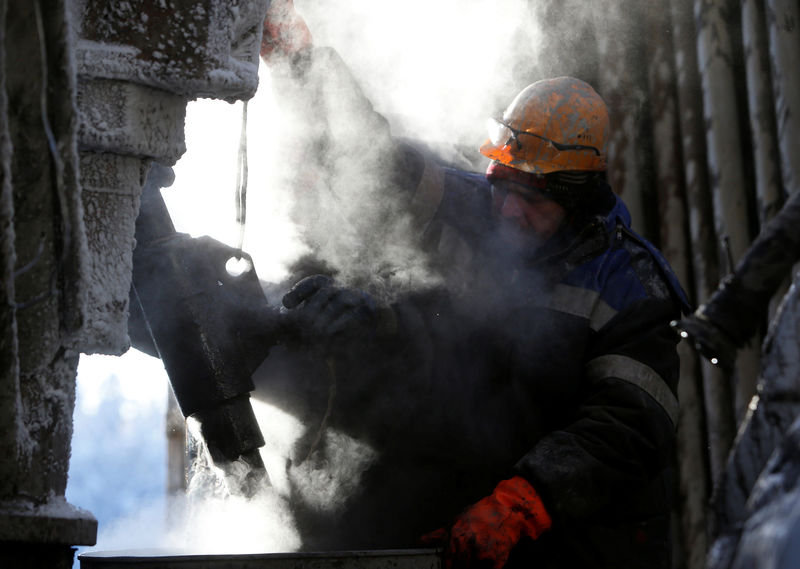By Vladimir Soldatkin and Olesya Astakhova
MOSCOW (Reuters) - It has defeated armies trying to invade Russia in the past, and now the fabled Russian winter has come to Moscow's rescue again, this time helping it comply with a deal among world oil exporters on cutting output.
Russia, which has in the past been accused of dragging its feet in implementing oil production and exports deals, reduced production by 100,000 barrels a day in the first few days of January, industry sources told Reuters. That is a third of the way towards the total cut Russia promised to deliver by mid-2017.
That reduction, or at least part of it, is the result not so much of Russian zeal to honour the agreement as it is to unusually cold temperatures in Siberia that have forced work at oil rigs to grind to a shivering halt.
Late last month and in early January, temperatures fell as low as minus 60 Celsius (minus 76 Fahrenheit) across Siberia, rendering metal brittle, causing power supply disruptions, halting cars' engines and making it impossible for people to work outside in the open air.
"Usually, all the working activity is stopped when it is minus 48 (Celsius). Otherwise, you have to face the consequences," an oilman who makes regular work trips to Western Siberia said by phone, requesting anonymity as he was not authorised to talk to the media.
"Once, a crane in Noyabrsk (Western Siberia) just tumbled down. Metal doesn't bend when it is minus 60, it just crumbles," the oilman said in Moscow on Tuesday.
Harsh Russian winters played a decisive role in defeating the invading armies of French ruler Napoleon Bonaparte and Nazi dictator Adolf Hitler. The term "General Frost" was coined in recognition of the power of cold weather.
The Western Siberian region - which occupies a vast territory between the Urals mountains and the Yenisei river, the geographical centre of Russia - accounts for around two thirds of Russia's total oil production.
The winter climate there is always harsh, but it is unusual for temperatures to fall as low as they are now.
Another oilman, from the Siberian region of Khanty-Mansiisk, said when cold snaps hit, he had to keep his vehicle's engine running round the clock, because if it was switched off it was unlikely to start again.
NEW WELLS
Locals say the cold weather has also prevented maintenance and repair work at oil fields and the drilling of new wells.
"We planned to launch a new well, but the cold of minus 50 struck and there were problems with power supplies. We had to postpone it," said a third Russian oilman, who also did not want to be identified.
Russia registered one of the sharpest drops in its oil output in the winter of 2005/2006, when Siberia experienced comparable low temperatures. In January 2006, Russian production declined by 180,000 barrels per day, at the time the biggest monthly drop in seven years.
Under a deal finalised last year in Vienna, global oil exporters agreed to curb production in order to prop of weak world oil prices.
Some oil companies in Russia, which had been producing at post-Soviet record levels, were reluctant to cut, but fell into line after the Kremlin said it supported a global deal.
Under the deal, Russia committed to cut its oil output by 300,000 barrels per day (bpd) from the level of 11.247 million bpd reached in October last year.
The reduction will come in stages, which Russia cutting output by 200,000 barrels per day by the end of the first quarter, and later by 300,000 bpd.
Valery Nesterov, an analyst at Moscow-based Sberbank CIB, said it was too early to say if the cuts observed since the start of January were made in line with the OPEC deal, or if it was down to other factors.
"Of course, the extreme cold affects production and drilling, which are typically lower in winter," he said.
"There will be a more deliberate decline in the second quarter when Russia will have to catch up with its cuts pledges."
Kremlin spokesman Dmitry Peskov said on Tuesday that Russia was fulfilling all its obligations under the global deal on output cuts, but referred questions about the reason for the drop in January to the Energy Ministry. A spokeswoman at the ministry declined to comment.

Russian state weather forecaster Hydrometcentre said it expected temperatures in West Siberia's Khanty-Mansiisk region to stay below minus 30-35 Celsius through to Thursday and at around minus 20 Celsius into next week.